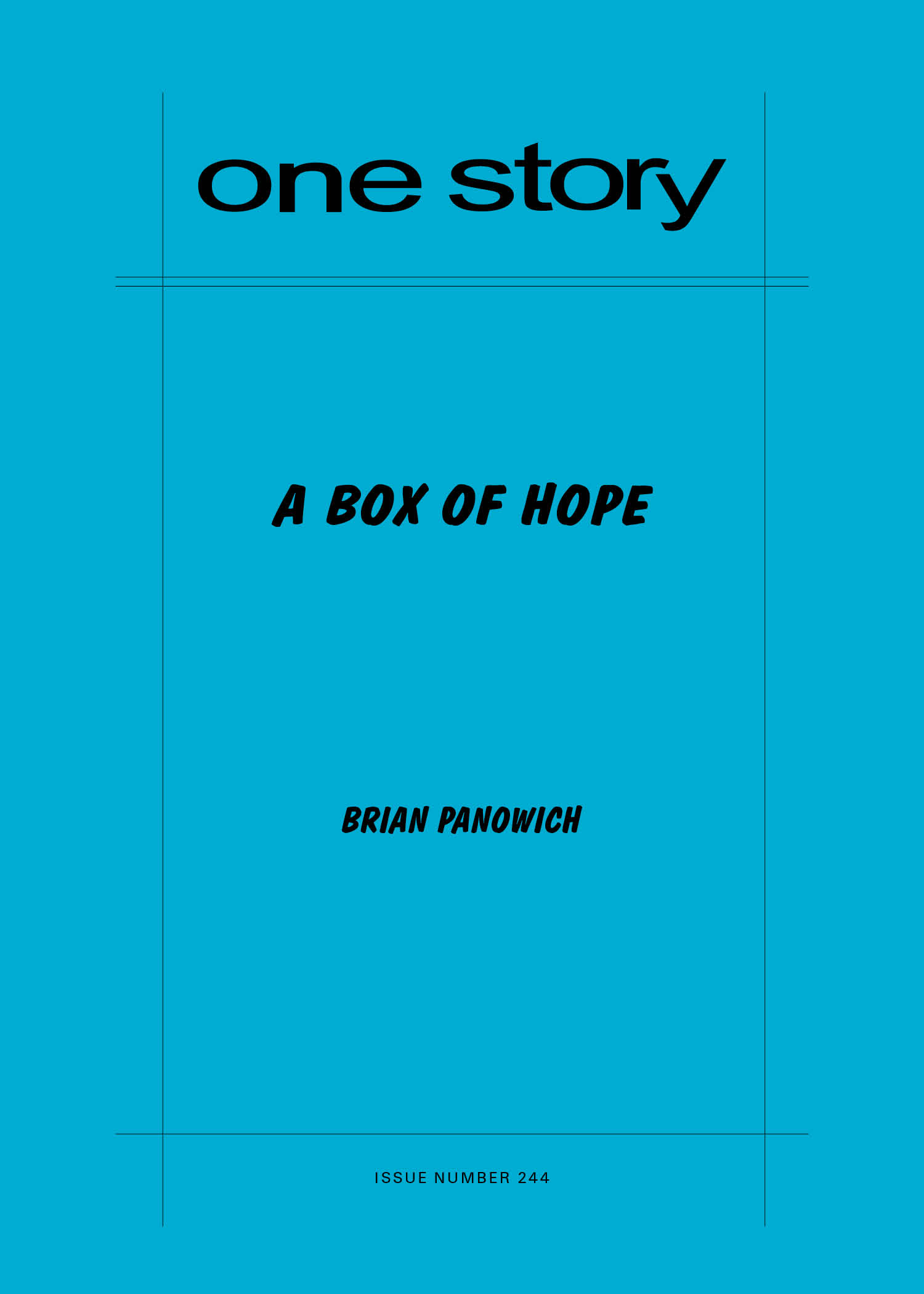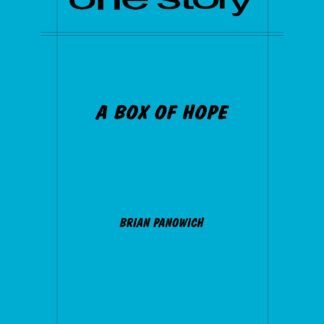
A Box of Hope
$2.50
18 in stock
Excerpt
Will sat on the front porch of the house, his feet tucked in close to his body. He’d been sitting in that spot, staring out into the yard, for at least a hundred years or so. He sat and watched both the ghost of his father and a younger version of himself playing tag football in the thick overgrown crabgrass. His old man purposely leaving himself wide open and slowing his movements to let his boy win. Will watched the figments of his imagination climb on the monkey bars that his father had spent a full two weeks yelling at while building piece by piece so many summers ago. The jungle gym started out as a huge flat cardboard box that a truck from K-Mart had dropped off in the driveway, but Will’s father slowly erected it into a steel fortress for them to climb and conquer together. Now it just looked like frail and rusted dinosaur bones—the carcass of some ancient dead thing that had chosen his front yard for its final resting place.
Brian Panowich
Brian Panowich is the award-winning author of Bull Mountain (Putnam Books). The novel topped both Amazon’s and iTunes iBooks’s “Best of the year” lists in 2015. The novel also won the ITW Award (2016) for Best Debut Novel, as well as the Pat Conroy Award (formally the SIBA Award) (2016) for Best Mystery. The book was nominated for the Barry Award, the Anthony Award, The Georgia Townsend Book Prize, and was a finalist for the 2016 Los Angeles Times Book Prize. His second novel, Like Lions (St. Martin’s), is slated for a Spring 2019 release, followed by Year Of The Rooster in 2020. Brian is also the featured columnist for Augusta Magazine.
Patrick Ryan on “A Box of Hope”
I’m always interested in the story behind the story. That is, the inspiration that had to be there in order for the story to come into existence. In the case of “A Box of Hope” by Brian Panowich, the inspiration was a tragedy—the death of the author’s father—and the original idea was to imagine a conversation the author might have with a younger version of his dad. As is so often the case with inspiration and creativity, the result is something very different.
“A Box of Hope” takes place on a front porch over a period of roughly half an hour. A wake is going on, and the deceased’s fifteen-year-old son, Will, is grieving, brooding, and mad enough to punch someone. Then along comes Jack: his father’s younger brother, a man Will has never met, a man his father wasn’t close to, a man his mother despises.
Our new issue is, in part, an investigation into the nature of hope and the trust it brings with it. Hope can take many forms and can spring from some very unlikely sources. It can be as unexpected as it is welcome. And it can be anything but simple. For me, the most interesting takeaway from Brian Panowich’s story—and the thing that first drew me to it—is the oft-overlooked reality that hope can sometimes be complicated.
Q&A by Patrick Ryan
- PR: Where did the idea for this story come from?
- BP: I’ve been writing variations of this story for over sixteen years. My father died in 2002 from throat cancer. He was also a singer/songwriter who never smoked a cigarette a day in his life. So to me, the circumstances surrounding his getting sick felt like a cruel joke. He fought it hard, though, and we all thought he’d beaten it after he elected to have the tumor taken out—along with his vocal cords. Afterward, he could only eat through a feeding tube. He couldn’t speak without a machine, and he would never sing again. And he endured all this without a single complaint, until one year later that murderous disease came back for a second round. My father went down swinging but this time it killed him. I was devastated and I was angry. I was twenty-nine when he died and had spent twenty-one of those years at odds with my old man, but right around my twenty-second birthday our relationship changed. I finally saw him for who he was and I knew I was just like him. We talked about things that mattered. He became my best friend. I loved him. I needed him. I was gutted when he died. I couldn’t escape the two decades of time I’d wasted being a punk kid who took him for granted. I also didn’t know how to process that anger—or the guilt I felt. That part of my life quickly became the most self-destructive part as well, so to remedy that problem over the years that followed, I’ve tried to keep these feelings at bay in a variety of different formats—essays, songs, journal entries, blog posts, letters, and most recently fiction. So this story, although very different from the circumstances involving my own father’s death, is just another attempt at me trying to find some kind of solace—a way to cope with that loss. It didn’t work, either. At least not the way I wanted it to, as catharsis goes, even though my dad is all over this story; he had a mad love for comic books. He did build me a jungle gym. He loved Gram Parsons, hence the fictional family’s name, etc. But regardless of my intent, in the end I think it made for an entertaining story.
- PR: The entire story takes place on a front porch (with one brief exception). And the entire story, by my estimation, takes place over a timespan of less than thirty minutes. Was that always the plan? And did you find it at all confining?
- BP: There was no plan. And I never thought of it as confining. Mainly because every story I write, regardless of the premise, always feels to me like it’s part of a bigger picture. This story was never intended to be one small piece of a bigger whole, but who knows? Maybe it will be someday. And even though the entire thing plays out over a limited period of time, I’ve come to learn that when your world falls apart—and I mean, when it really takes a beating—it tends to happen very quickly, if not all at once. The news following a late-night knock at the door that takes your breath away or the hit that doubles you over after the phone rings at one in the morning. What happened to Will’s father in the story. These aren’t events that unfold over time. These are the things that cut your life down the middle and it happens in a flash. I hoped to convey a little of that urgency in this story—a truly defining line between the before and after for Will, as well as the newly defined line drawn by his Uncle Jack at the end.
- PR: Visually and stylistically, is Uncle Jack based on someone you’ve known or observed?
- BP: Jack is my father had his life played out the way he originally intended—as a young man trying to follow in the footsteps of Waylon Jennings. He played music professionally on the cusp of the Counrty & Western Outlaw movement with the kind of passion that never completely faded—until us. I tried to envision a version of my dad the way he may have turned out if he hadn’t met my mother, had two children, and a new family to support. So I built on that imaginary construct, combined with old photos and stories my mother has told me. The whole outlaw bit changed obviously when he suddenly had a family to provide for and he became more like Will’s dad in the story. So Jack is at least aesthetically who my father would’ve become if he hadn’t followed the road that led to me.
- PR: What was the biggest challenge in bringing the story onto the page? Or what was the biggest surprise? Another way I sometimes ask this is, how different is the finished story from the one you first envisioned?
- BP: I had no idea what kind of story this was going to be when I sat down to write it. It was originally supposed to be an experiment—a story about me having a conversation with a younger and much different version of my dad, like the one I mentioned above. As I began to write, it just started to make sense that the fictitious version of me in the story should be younger as well, so I did that, but as the story grew and became more organic—the more fresh dirt I piled on top of it—the more it stopped being about my dad and me and became about the Parsons family. They had become their own people and taken on their own identities. Everything I had originally set out to do took a backseat to these new people who I had brought to life. Their pain and problems became the new premise. I love it when that happens. When the characters start dictating to me how the story is going to go and it’s almost like I exist just to write it all down for them. At that point, I stop being the creative force behind their world and they take the reins. That probably sounds insane, but Will Parsons and his Uncle Jack, even Will’s mother—thanks to the editing process this story went through—feel like real people to me now and always will. I probably should get out of the house more.
- PR: I’m wording this question carefully so that it (hopefully) doesn’t spoil anything: Have you given any thought to how long it might be before Will uses that phone number?
- BP: I can tell you exactly when he’ll use it. The minute it all becomes too much for him to handle on his own. As soon as he finds himself completely lost inside that blackened pit burned into his chest by that huge loss. As soon as he’s convinced himself that there isn’t a single person on the planet who understands what he’s going through. That’s when he’ll pick up the phone—and Jack is counting on it.
- PR: Finish this sentence in just one word—the word you think best captures it: “This story is about __________.”?
- BP: Hope. It’s right there in the title. But I’m not talking about a lighthouse here. I’m talking about hope in its darkest form. To quote Foy Vance, “Hope deals the hardest blows.” He’s absolutely right.
- PR: What are you working on now?
- BP: I just finished my second novel, Like Lions, due in March of 2019 from St. Martin’s Press, and I’m currently polishing my third, Year of the Rooster (also St. Martin’s), due Spring 2020. I also churn out a monthly column in Augusta Magazine called “Scattered & Covered.” And now after writing this interview, I’m thinking about writing another short story about Will Parsons’s first phone call to his Uncle Jack...
- PR: What is the best bit of advice about writing you have ever received?
- BP: There are no rules to the game. Just write it down and don’t let anyone tell you how to do it—except your editor.
